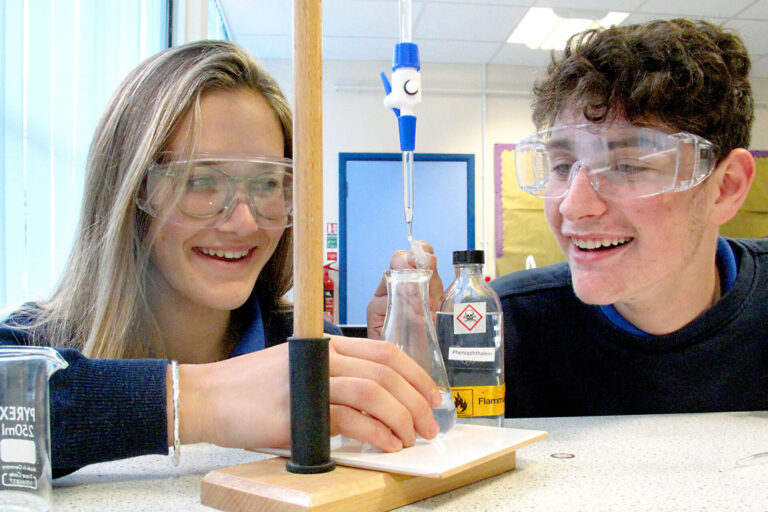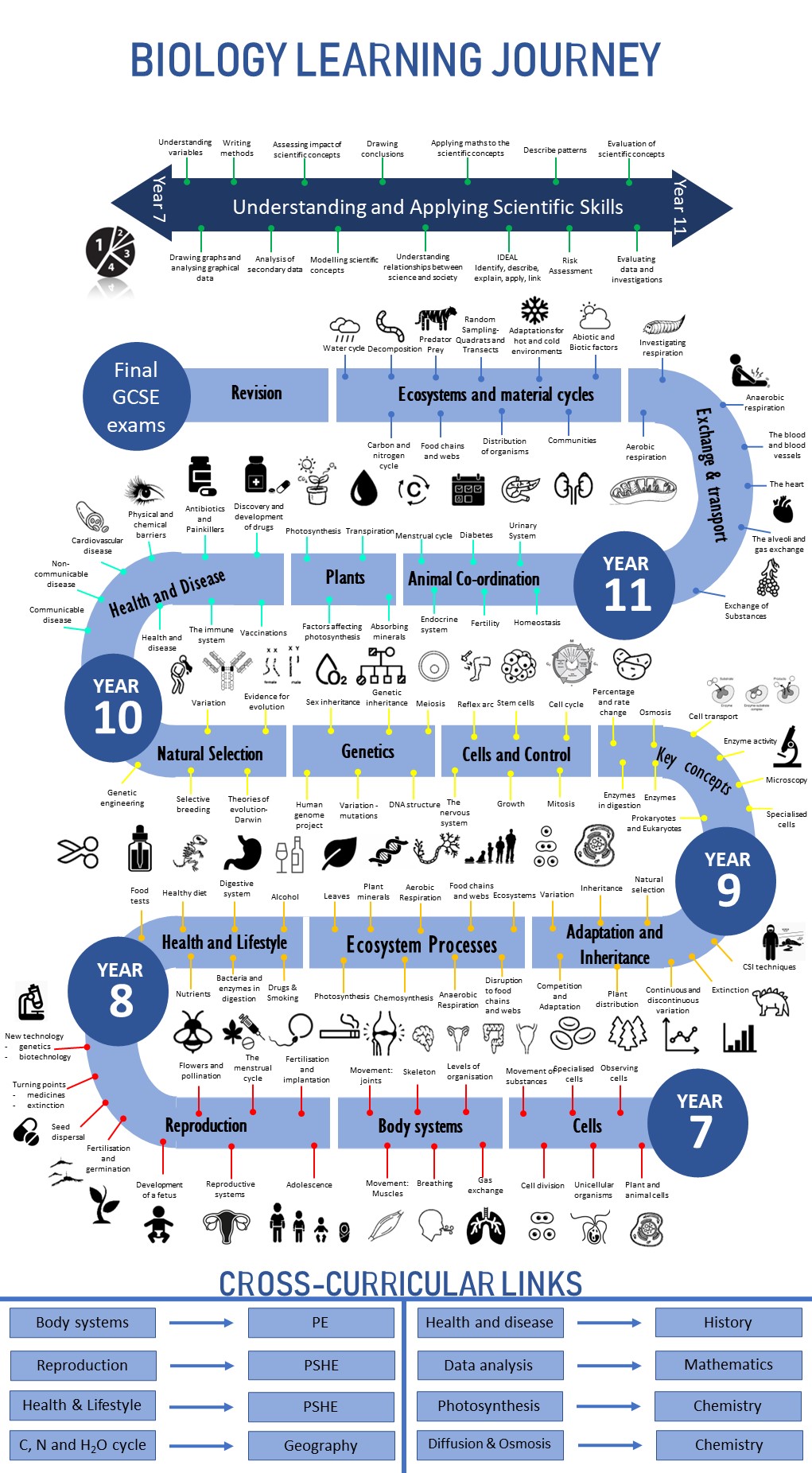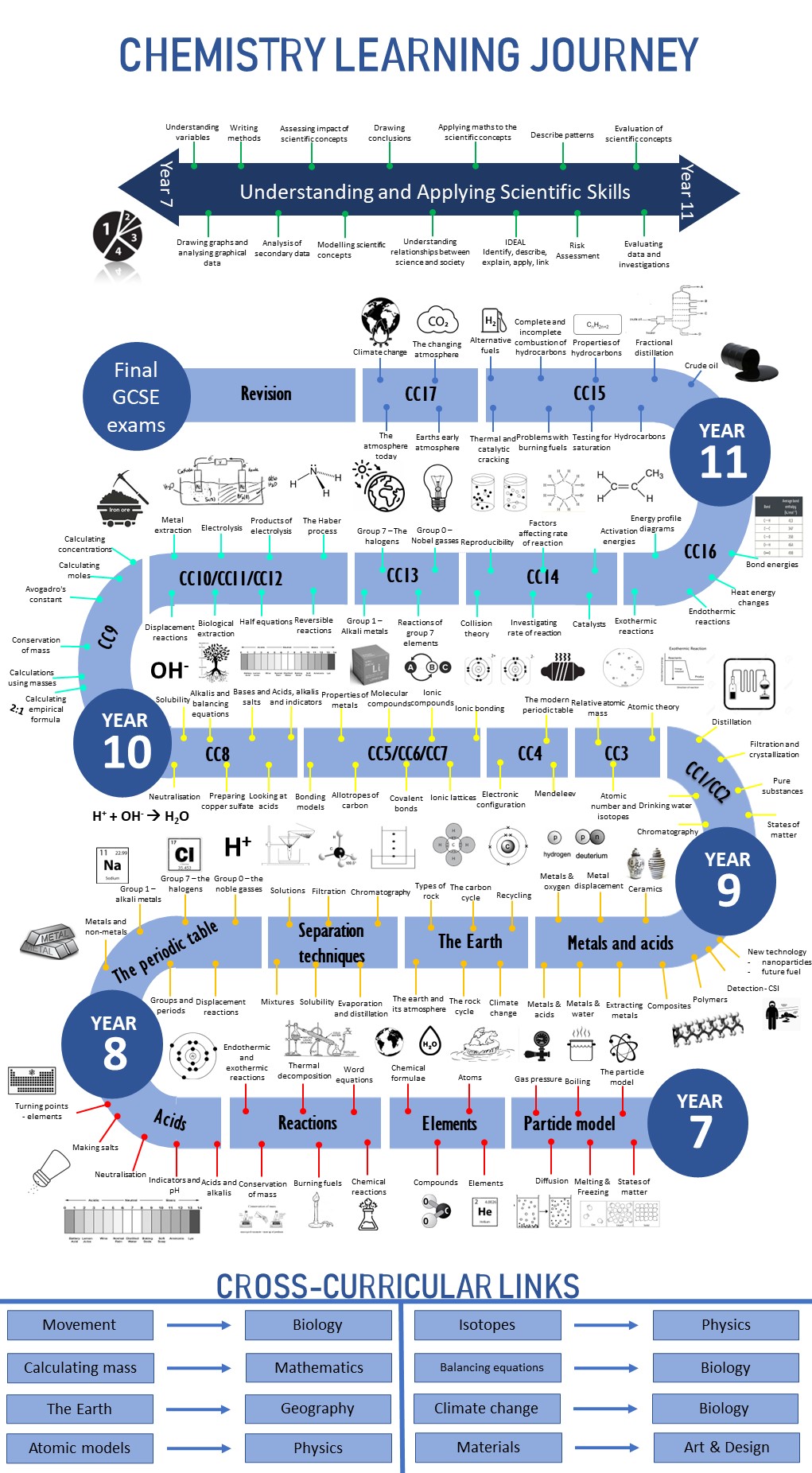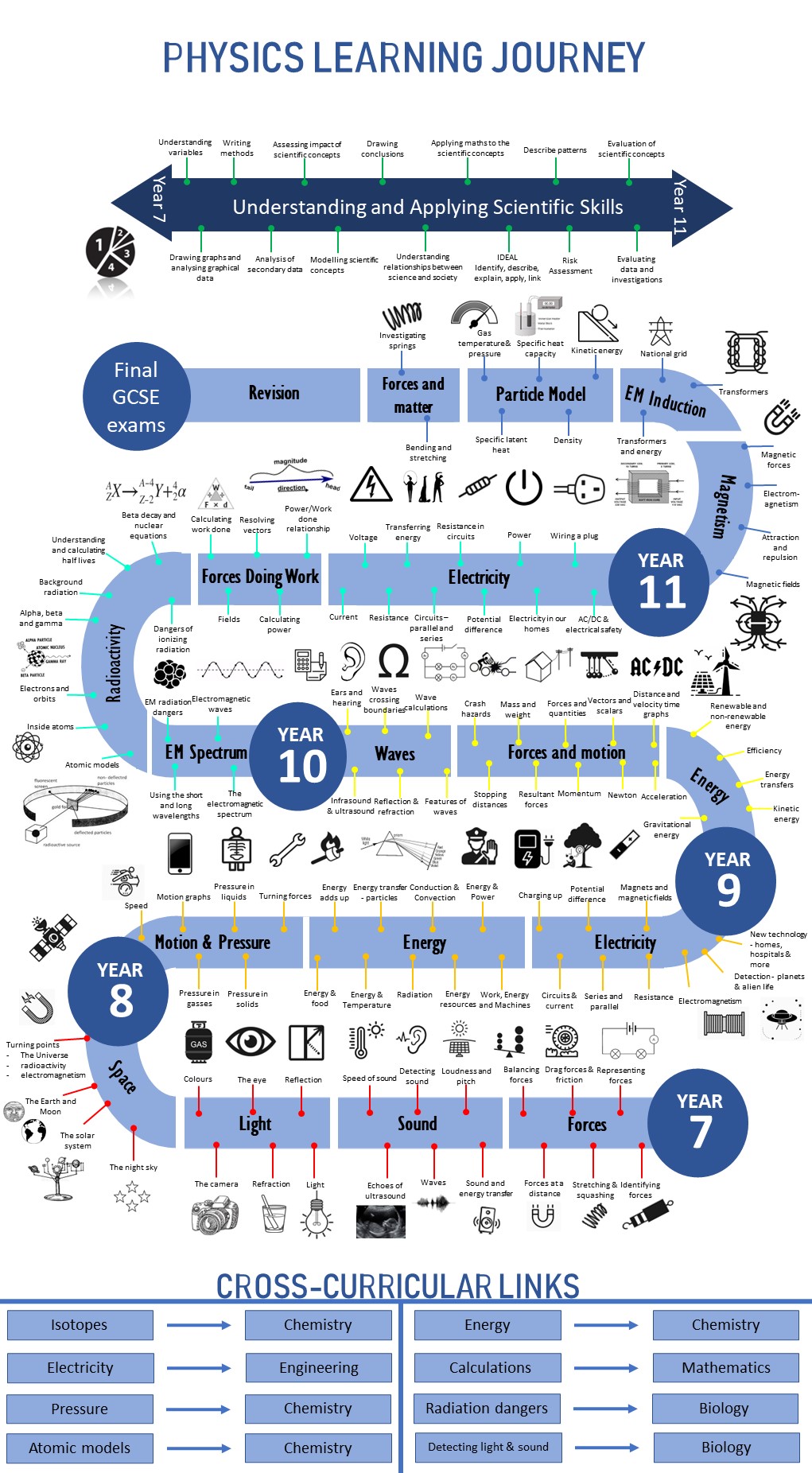Science
Science teaching encourages students to develop and explore their natural inquisitive nature about the world around them. Students are engaged through carefully chosen and challenging practical activities. This allows them to apply their knowledge in novel situations and explore scientific concepts and skills.
There are many opportunities for students to take part in learning outside the classroom.

Science teaching encourages students to develop and explore their natural inquisitive nature about the world around them. Students are engaged through carefully chosen and challenging practical activities. This allows them to apply their knowledge in novel situations and explore scientific concepts and skills. There are many opportunities for students to take part in learning outside the classroom.
Regular trips include a visit to the Plymouth National Marine Aquarium, events run by Exeter University, and Science Live days for KS4 and KS5 students. Biology fieldwork trips provides the chance for students to explore the local environment. Our well-established STEM club includes involvement in national robotics competitions and the Bloodhound Rocket Car challenge.
Our curriculum facilitates the development of depth and quality of learning. ‘If nothing has been changed in long-term memory, then nothing has been learned.’ (John Sweller and Paul Kirschner)
The science curriculum spirals upwards throughout KS3 and KS4, allowing students to revisit and deepen their knowledge and understanding of key ideas throughout their science education. This prepares them well for further and higher education as well as embedding crucial skills for employment. The department employs a rigorous but differentiated assessment system which allows us to track students’ progress from Year 7 to Year 11. This enables us to provide effective intervention where needed and challenge and stretch high attaining students.
GCSE students follow either the Edexcel Combined Science course or three Separate Science GCSEs in Biology Chemistry and Physics. All students from Year 10 onwards have a dedicated specialist teacher in Biology Chemistry and Physics. This allows us to encourage students to pursue Science subjects in KS5 and beyond.
At the beginning of KS4 students all embark on the Edexcel Combined Science course. During the latter half of Year 10, formal assessments allow us to determine which students might be suited to the additional challenge and commitment of the Separate Science courses which allows students to pursue separate GCSE’s in Biology, Chemistry, and Physics.
Biology
Biology
The Biology course constitutes nine topics covering a wide range of biological concepts which give students a broad and balanced understanding of some of the most important and relevant concepts in Biology. This fosters a curiosity about the natural world and a passion for conserving it.
During the course students develop both their laboratory and fieldwork skills through a series of core practicals embedded within the nine topics.
Below is a summary of the two biology papers which all students will sit at the end of the course.
Paper 1 (Paper code: 1BI0/1F, 1BI0/1H)
Written examination: 1 hour and 45 minutes
50% of the qualification – 100 marks
Content overview
Topic 1 – Key concepts in biologyTopic 2 – Cells and controlTopic 3 – GeneticsTopic 4 – Natural selection and genetic modificationTopic 5 – Health, disease and the development of medicinesAssessment overview
A mixture of different question styles, including multiple-choice questions, short answer questions, calculations and extended open-response questions.
Calculators may be used in the examination. Information on the use of calculators during the examinations for this qualification can be found in Appendix 8: Calculators.
Paper 2 (Paper code: 1BI0/2F, 1BI0/2H)
Written examination: 1 hour and 45 minutes
50% of the qualification – 100 marks
Content overview
Topic 1 – Key concepts in biologyTopic 6 – Plant structures and their functionsTopic 7 – Animal coordination, control and homeostasisTopic 8 – Exchange and transport in animalsTopic 9 – Ecosystems and material cyclesAssessment overview
A mixture of different question styles, including multiple-choice questions, short answer questions, calculations and extended open-response questions.
Calculators may be used in the examination. Information on the use of calculators during the examinations for this qualification can be found in Appendix 8: Calculators.
Chemistry
Chemistry
Students are given the opportunity to explore the exciting chemical world around them. They investigate the underlying structure of matter and how this governs the reactions and properties of substances.
The course constitutes eight topics which give the students a broad and balanced understanding of some of the most important and relevant concepts in chemistry.
During the course students refine their practical laboratory skills. The sequence of Core Practicals required by the course ensure that all students have the opportunity to become confident and independent young scientists.
Below is a summary of the two chemistry papers which all students will sit at the end of the course.
Chemistry 1
Written examination: 1 hour and 10 minutes Combined Science or 1 hour and 45 minutes Separate Chemistry.
Content overview
Topic 1 – Key concepts in chemistry, Topic 2 – States of matter and mixtures, Topic 3 – Chemical changes, Topic 4 – Extracting metals and equilibria. Separate Only: Topic 5 – Transition Metals and Alloys.
Assessment overview
A mixture of different question styles, including multiple-choice questions, short answer questions, calculations and extended open-response questions.
Chemistry 2
Written examination: 1 hour and 10 minutes Combined Science or 1 hour and 45 minutes Separate Chemistry.
Content overview
Topic 1 – Key concepts in chemistry, Topic 6 – Groups in the periodic table, Topic 7 – Rates of reaction and energy changes, Topic 8 – Fuels and Earth science. Separate Chemistry Topic 9 – Organic, Quantitative and Qualitative Chemistry.
Assessment overview
A mixture of different question styles, including multiple-choice questions, short-answer questions, calculations and extended open-response questions.
English Language A Level is a very different course from GCSE English Language. Students learn about the language of individuals and society, exploring issues of diversity such as gender and ethnicity, accent and dialect and how these are represented in texts. Students will also develop their grammatical knowledge and be supported to be able to analyse a variety of texts to establish how meanings and representations are created.
The course is topic led, exploring how language has changed from a tribal guttural language to the global language that is used by billions of people around the world as a first language or a contact language. We explore the impact of new technologies and consider how children acquire language from before birth and through their formative years. We learn about the theories of a variety of linguists and develop the skills to respond evaluatively to language data in the form of transcripts, articles or media texts.
The course is assessed through two external examinations and a non-examined assessment which is an individual investigation into language in action. Students choose their own investigation topic and develop a 2000 word written response which is supported by their own research findings. In addition, students will be invited to submit an example of their own original writing.
Throughout the course, students are encouraged to respond creatively to the topics covered. We undertake tasks such as writing a fairy tale that challenges gender stereotypes, an article that argues that language is in decline because of social media and even write our own stories for children (which we have taken into a local primary school in the past to read to the children and get feedback!)
The English Language course is challenging, theory based and varied. We encourage our students to become language investigators and to be aware of the fascinating way that language shapes our world.
Physics
Physics
The physics course is incredibly diverse and provides huge scope for students to satisfy their inquisitive nature at to the way the universe works; from the tiniest atoms to the largest structures in the universe.
Combined Science
The Physics component of Combined Science award is assessed over two examination papers taken at the end of the course.
Paper 5: Physics 1
Written examination: 1 hour and 10 minutes.
Content overview
Topic 1 – Key concepts of physicsTopic 2 – Motion and forcesTopic 3 – Conservation of energyTopic 4 – WavesTopic 5 – Light and the electromagnetic spectrumTopic 6 – RadioactivityAssessment overview
A mixture of different question styles, including multiple-choice questions, short answer questions, calculations and extended open-response questions.
Paper 6: Physics 2
Written examination: 1 hour 10 minutes
Content overview
Topic 1 – Key concepts of physics.Topic 8 – Energy – Forces doing workTopic 9 – Forces and their effectsTopic 10 – Electricity and circuitsTopic 12 – Magnetism and the motor effectTopic 13 – Electromagnetic inductionTopic 14 – Particle modelTopic 15 – Forces and matterAssessment overview
A mixture of different question styles, including multiple-choice questions, short answer questions, calculations and extended open-response questions.
Separate Physics
The Physics component of Combined Science award is assessed over two examination papers taken at the end of the course.
Paper 1
Written examination: 1 hour and 45 minutes
Content overview
Topic 1 – Key concepts of physicsTopic 2 – Motion and forcesTopic 3 – Conservation of energyTopic 4 – WavesTopic 5 – Light and the electromagnetic spectrumTopic 6 – RadioactivityTopic 7 – AstronomyAssessment overview
A mixture of different question styles, including multiple-choice questions, short answer questions, calculations and extended open-response questions.
Paper 2
Written examination: 1 hour and 45 minutes
Content overview
Topic 1 – Key concepts of physicsTopic 8 – Energy – Forces doing workTopic 9 – Forces and their effectsTopic 10 – Electricity and circuitsTopic 11 – Static electricityTopic 12 – Magnetism and the motor effectTopic 13 – Electromagnetic inductionTopic 14 – Particle modelTopic 15 – Forces and matterAssessment overview
A mixture of different question styles, including multiple-choice questions, short answer questions, calculations and extended open-response questions.
Biology
Staff
Mrs T Ballam, Mrs K Walker, Mr S Walker, Mrs K Wills
Overview
Biology involves the study of a wide range of exciting topics ranging from molecular biology ecosystems; from microorganisms to mammoths. Studying Biology can open up a huge range of careers, from the more familiar medical and laboratory jobs to managing trials, scientific sales and advisory roles. Biology A level is enhanced by, and enhances, the following subjects: Chemistry, Geography, Environmental Science and Psychology. A good understanding of Maths is essential, representing 10% of examined marks and hence studying Maths A level or Core Maths in combination with Biology is advantageous and encouraged.
Minimum Entry Requirement
Two Separate GCSE Sciences at Grade 6 or above, preferably from Biology and Chemistry; or alternatively two GCSE Grade 6 or above from Combined Science. A GCSE Grade 6 or above in Maths and English is also required.
Curriculum
Biological MoleculesCells and VirusesClassificationExchange and TransportEnergy for Biological ProcessesMicrobiology and PathogensModern GeneticsOrigins of Genetic VariationControl SystemsEcosystemsAssessment & Reporting
Year 12
Students will have two internal assessments – one during the Spring term and one during the Summer term. These assessments are internal and will not have any bearing on the final A level grade
Year 13
Paper 1: Advanced Biochemistry, Microbiology and GeneticsQuestions draw on content from topics 1 to 7
A written exam lasting 1 hour 45 minutes which forms 30% of the A level.Paper 2: Advanced Physiology, Evolution and Ecology
Questions draw on content from topics 1 to 4, 8, 9 & 10
The paper length, weight and format is the same as for paper 1Paper 3: General and Practical Principles in Biology
A written exam lasting 2 hours 30 minutes, worth 40% of the total marks. The paper may include short open, open-response, calculations and extended writing questions. It will also include synoptic questions that may draw on two or more different topics. This paper examines the conceptual and theoretical understanding of experimental methods.
Facilities
We have subject specific classrooms with access to IT equipment.
Additional Activities
A number of activities take place throughout the year and are publicised in lessons.
Chemistry
Staff
Miss K Hamshere, Mrs H Kelly, Ms E Padmore
Overview
Chemistry is one of the fundamental ways that we can learn about our environment, what makes things work and even life itself. It is a requirement for a number of important careers and useful for a great many more. Chemistry fits well with the other Science disciplines and with Maths and it is essential for many degrees in related subjects. Our aim is to develop students who have a detailed knowledge and understanding of the subject and are able to think through problems in a logical and scientific way. Chemistry is essentially a practical subject and we aim to let the students do as much practical investigation as possible.
Minimum Entry Requirement
Two Separate Science GCSEs at Grade 6 or above including Chemistry, or alternatively two GCSEs Grade 6 from the Combined Science. A GCSE Grade 6 or above in Maths is essential due to a minimum of 20% of the available marks being awarded for Maths at Level 2 standard or above. A GCSE Grade 6 or above in English is also required. It is advisable to be studying A Level Maths and another Science A Level alongside this course.
Curriculum
Paper 1. Inorganic and Physical Chemistry.Paper 2. Organic and Physical Chemistry.Paper 3. Practical Skills, Data Handling and Synopsis.Practical Skills: (16 Core Practicals) These will be delivered during the course and they will beassessed in the theory papers.
Assessment & Reporting
Year 12
Students will have two internal assessments – one during the Spring term and one during the Summer term. These assessments will not have any bearing on the final A Level grade however, students will be expected to perform well to secure their progress into Year 13.
Year 13
Paper 1. Written Exam lasting one hour 45 minutes worth 90 marks. A mixture of both short andlong answer questions. This forms 30% of the A Level.Paper 2. Written Exam lasting of one hour 45 minutes worth 90 marks. A mixture of both short and
long answer questions. This forms 30% of the A level.Paper 3. Written Exam lasting two hours 30 minutes worth 120 marks. The paper may include
multiple-choice, short open, open-response, calculations and extended writing questions. This
forms 40% of the A Level.Practical endorsement- confirmation on completion of all 16 core practicals.
Facilities
We aim to carry out all lessons in a laboratory which is equipped with the necessary apparatus. Most of our laboratories are furnished with extractors and fume cupboards; we also have access to safety equipment whenever necessary.
Additional Activities
The students are involved in visits for example, The University of Exeter Organic Molecules practical day and A Level Chemistry Live. We also aim to offer our students the opportunity to be involved in the UK Chemistry Olympiad.
Physics
Staff
Mr D Moffatt, Mr S Ransome-Williams
Overview
The aim of the Physics course is to teach a sound knowledge and understanding of physical principles together with developing scientific problem solving skills both practical and theoretical in nature. The course seeks to develop an enthusiasm for the subject and stimulate enquiring minds. Physics leads to many possible university courses and careers, which can vary from pure research through science journalism to finance. It can provide useful background and insight into some of the most exciting scientific developments today as well as demonstrating a student’s ability to grasp and manipulate complex ideas. Questions assessing mathematical skills at Level 2 or above will form 40% of the marks across the three papers.
Minimum Entry Requirement
Two separate Science GCSEs at Grade 6 or above including Physics, or alternatively two GCSEs Grade 6 or above from combined Science.
Curriculum
Year 12
The course will include Measurements and their errors, Particles and radiation, Waves, Mechanics and materials and Electricity.
Year 13
The course will include Further mechanics and thermal physics, Fields and their consequences, Nuclear physics, Options, Astrophysics, Medical physics, Engineering physics, Turning points in physics and Electronics.
Assessment & Reporting
Year 12
Students will have two internal assessments – one during the Spring term and one during the Summer term. These assessments will not have any bearing on the final A Level grade, however,
students will be expected to obtain a D Grade or above in the Summer assessment to progress to Year 13.
Year 13
Paper 1 – One hour 45 minutes written exam totalling 90 marks, which forms 30% of the A Level.Paper 2 – One hour 45 minutes written exam totalling 90 marks, which forms 30% of the A Level.Paper 3 – Two hours 30 minutes written exam totalling 120 marks, which forms 40% of the A Level.Facilities
The Physics department uses a variety of specialist equipment to help illustrate the theory and mathematics behind the concepts taught.
Additional Activities
The students will attend the Particle Physics Day at Southampton University which will provide an opportunity for students to attend lectures and take part in some data analysis using the university facilities and laboratories. Students will also attend other lectures and competitions when they arise.



